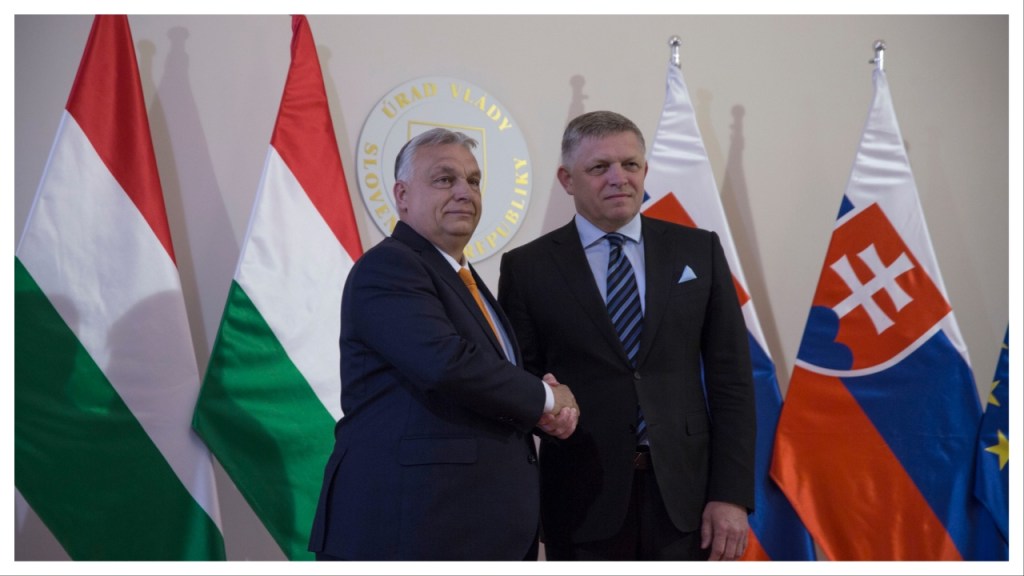It’s been nearly a year since Slovakia’s hard-right minister for culture Martina Šimkovičová fired Matej Drlička from his position as director of the Slovak National Theatre, the country’s oldest and most significant theatre. While there was no immediate explanation, the move was seen as part of the government’s crackdown on contemporary culture with the minister, a member of the far-right Slovak National party, claiming she wanted to promote more “Slovak culture”. Since then a swathe of directors at cultural institutions have been fired in the country without any reasonable explanation.
At the Karlovy Vary Film Festival’s International Industry Insights Forum on Monday, Drlička made an impassioned speech to an audience at the festival’s industry headquarters where he told delegates it “was important to understand what’s happening in your own neighborhood.”
“I don’t want to be too political, but we are living in an era when it is important to be political and it is important to speak out because I think that the liberty of the freedom of arts is endangered not only in our country…but also maybe other countries,” he said. “Every democracy has ups and downs and, unfortunately, Slovakia is going steeply down.”
Slovakia, which has a population of just 5 million people, has been an independent country since 1993 when the former Czechoslovakia peacefully split into two states (the other being the Czech Republic). Slovakia became a member of NATO in March 2004 and part of the European Union in May the same year.
Drlička compared the situation in Slovakia to Hungary, where that country’s Prime Minister Viktor Orban has clamped down enormously on the cultural sector since he returned to power in 2010 and has steadily shaped the country’s cultural sector to a more nationalist and increasingly censored one. In March 2025, the Hungarian parliament fast-tracked anti-LGBTQ legislation, sparking street protests. Hungary, with its competitive 30% tax credit, has been a top destination for Hollywood projects such as the Dune franchise, Apple Original Films’ Matchbox and Season 1 of Peacock’s The Day of the Jackal.
“We observed the happenings in Hungary, where Orban clearly and successfully put pressure on culture and art across the last 14 years and has now put culture and arts under total political control,” said Drlička. “We were not brave enough to speak about it and now we have it in Slovakia with [Prime Minister] Robert Fico, through his minster Šimkovičová, putting immense pressure on Slovak culture, Slovak arts and we can speak clearly about normalization processes.”
Indeed, speaking at an additional panel during KVIFF’s Industry Section, Hungarian-Romanian writer-director Cristina Grosan admitted that the current situation in Hungary has had a direct impact on her work and seen her since relocate to Prague. Her first feature The Things Worth Weeping For was Hungarian while her second feature Ordinary Failures, which premiered in Venice in 2022, was a Czech production.
Speaking candidly about the current situation in Hungary, Grosan said: “There are lots of filmmakers with really good track records who keep applying for funding for various projects but never get any funding [in Hungary.] The reality is that there is a lot of money, which is mostly awarded to a selective group of people who have very strong ties in the leading party, which leaves a very big part of the industry either not working or working for free.”
She continued: “Often we filmmakers discuss this. How is it possible that some people are not supported? So, the situation in Hungary is that no one knows what the rules actually are. So, my work is indeed affected. I didn’t run away from the country because I was doing two films in parallel – The Things Worth Weeping For and Ordinary Failures. But seeing the situation in Hungary, I chose not to go back, which is sad for all the people who do not have this chance.”
In his passionate presentation in Karlovy Vary, Drlička played delegates some short videos of Šimkovičová where she claimed the “white race is endangered by the LGBTQ community” and another when she admits to having a marble bust made by renowned Renaissance artist Donatello removed from Slovakia’s Spiš Museum in Levoča. An additional video showed the minister saying: “Slovak culture must be Slovak and nothing else – we tolerate other cultures, but ours is not a mixture of others,” while a final video showed Lukas Machala, her pro-Putin chief of staff, theorize to a journalist that the Earth is flat.
“I think this speaks for itself,” Drlička told the audience, before delving into his personal experience.
“I was the general director of the Slovak National Theatre and since Martina Šimkovičová was appointed culture minister, there was a lot of tension,” he said, adding that the former TV presenter-turned-government-official was fired from working at the country’s Markíza channel in 2015 for posting hateful content about Syrian war refugees. (The minister has since posted frequent xenophobic, homophobic and pro-Russian content on Facebook).
Drlička continued: “The Slovak National Theatre was always a fortress of freedom of expression to Slovakia, and it played a very important role in 1968 [during the Prague Spring] and 1989 [the Fall of Communism], and it was supposed to play an important role now.
“But they found a simple solution, and in August 2024 in the morning, a lady from the ministry rang my doorbell and announced that I was debased without any official reason. The day after, the general director of the Slovak National Gallery, Alexandra Kusá [who headed the gallery for 14 years] stood up for me on Facebook and said it was inappropriate and not a way to dismiss the general director. She asked the minister to reconsider her decision and the next day, she was fired.”
Last August, after these firings, mass protests erupted against the minister in Slovakia in front of the ministry and the Slovak National Theatre. Since then, the ministry has fired Slovak National Museum head Branislav Panis – whose remit encompassed 18 museums – after working at the body for 25 years. In March 2024, it also fired Zusana Liptakova, who headed the International House of Art for Children.
“This is the reality of Slovakia as of now,” said Drlička. “And I think it’s very important for you to realize this and why we realize that this is not just a local fire. This will continue and it will continue to other countries, and we have to stand up and we have to speak very freely, and we have to prevent this fire from spreading to other countries.”
He continued: “We are a very fragile and young democracy. We don’t have strong institutions, and we don’t have strong media. Being fragile means that it is very easy for autocrats to erode it and to start deconstructing the freedoms of the country and this is exactly what is happening.”
He shared excerpts of a new Bratislava Declaration which is intended as a call to action directed at the EU for protective measures against cultural sectors being threatened in EU states. In it, it says: “We recognise the presence of an acute crisis that threatens artistic freedom and the independence of cultural institutions, within a growing number of EU Member States. The ongoing erosion of cultural infrastructure is profoundly destructive not only to cultural life in Europe but to the whole European project.
“We call on the European institutions to urgently acknowledge and address this emergency. Now is the time to act to prevent irreversible damage to Europe’s democratic cultural structures.”
Signatories so far include Culture Action Europe, the European Theatre Convention, Opera Europa and more. You can read the full declaration here.
The post Far-Right Purges On Culture Sectors In Slovakia & Hungary Spark Concern Among CEE Delegates In Karlovy Vary: “This Is Not Just A Local Fire” appeared first on Deadline.




